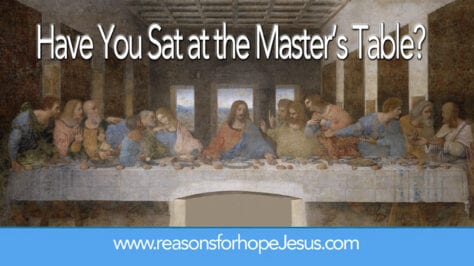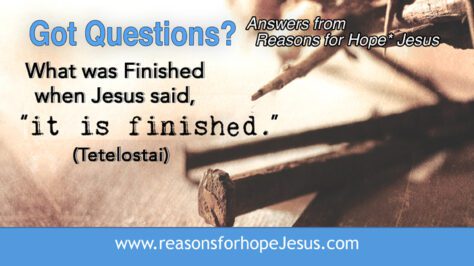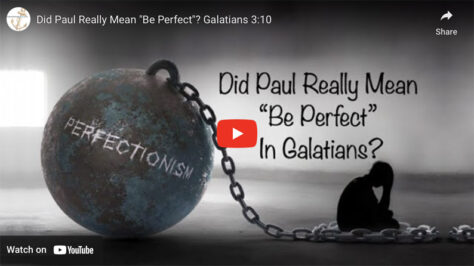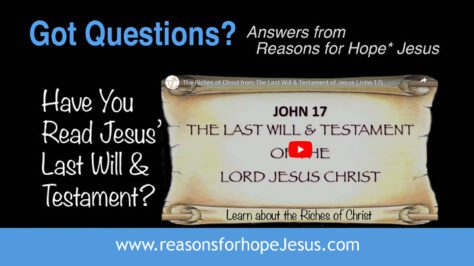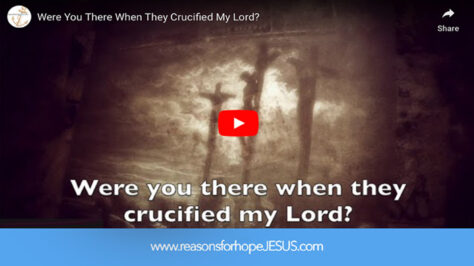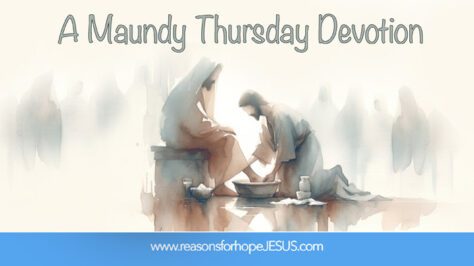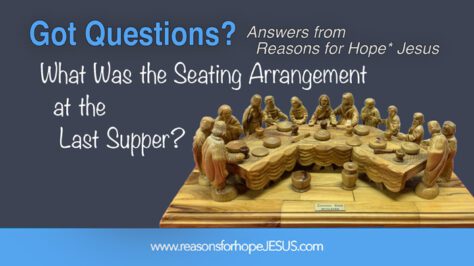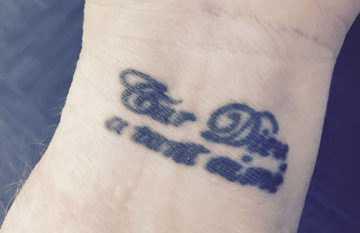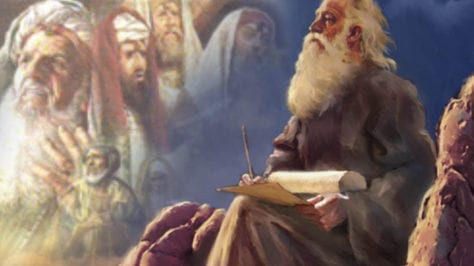Question received at questions@reasonsforhopejesus.com
I was reading the genealogy of Jesus in Matthew 1 and Luke 3 and have two related questions.
First, although the genealogy is essentially the same at the end points (Adam/Abraham to Joseph), the genealogy is different in the middle (Matthew lists Solomon as the son of David, whereas Luke lists Nathan). At the end, Matthew lists Joseph as the son of Jacob, while Luke lists Joseph as the son of Heli. I am not sure how to reconcile those differences.
Second, both genealogies trace Jesus’ lineage to David through Joseph, not Mary. But since Jesus does not have any earthly/blood linkage to Joseph, why is Jesus’ lineage to Joseph important? Joseph is Jesus’ father by adoption, so wouldn’t Jesus’ lineage to Mary be more important?
These are some of the most often-asked questions by skeptics in their attempts to discredit the Bible. They believe these are contradictions and, therefore, proclaim them to be errors in the Bible. However, as we know, there are no errors in the Bible. There are answers to all these questions and explanations to dispel any doubt.
The Genealogies of Jesus Christ
Matthew and Luke record the legal and blood-line genealogies that give proof of the promises of Genesis 3:15. In the Garden, immediately following the fall of man, God promised to send a “seed” who would rescue man from his fallen state. God spoke directly to the serpent Satan and said:
Genesis 3:15 And I will put enmity [hostility/hatred] between thee and the woman, and between thy seed and her seed; it [the seed of the woman who is Jesus Christ] shall bruise thy [Satan’s] head, and thou [Satan] shalt bruise his [the seed of the woman, Jesus Christ] heel.
From that time forward, God began revealing His purpose and plan to His people. With the birth of Jesus, God gave the world the promised Seed. With the birth of Jesus, God gave the world Light and Hope. And with the birth of Jesus, God fulfilled His promise to send a Conquerer.
The Genealogy of Jesus as Recorded in Matthew
Matthew’s first verse proclaims Jesus’ legal right as Messiah, the anointed one, a king who would come from the Tribe of Judah. The promised Seed was to come through Abraham (Genesis 22:18) and through David (Isaiah 11:1).
Matthew 1:1 The book of the generation of Jesus Christ, the son of David, the son of Abraham.
Matthew next proceeds to record the line of succession. As correctly noted, when this genealogy reaches David, the succession proceeds through King Solomon, whereas, in the book of Luke, it proceeds with Nathan, the second surviving son of King David.
Because Matthew presents Jesus as the coming Messiah to the nation of Israel, he provides a genealogy that begins with the father of the nation, Abraham. Matthew then continues his record through King Solomon, all the way to Jesus’ earthly father, Joseph. This is the record of Jesus’ genealogy through Joseph. It presents Jesus’ legal right to the throne of David, to be Messiah (anointed One or King) from the Tribe of Judah.
The Genealogy of Jesus as Recorded in Luke
The Gospel of Luke presents Jesus as the Son of Man and reveals Him in all His humanity to be 100% man. Luke begins with Joseph and traces the genealogy back to the first man Adam. Luke 3:23 records Joseph as the son of Heli. Matthew records Joseph as the son of Jacob.
Luke 3:23 And Jesus himself began to be about thirty years of age, being (as was supposed) the son of Joseph, which was the son of Heli
Matthew 1:16 And Jacob begat Joseph the husband of Mary, of whom was born Jesus, who is called Christ.
Is this a contradiction? These are clearly two different genealogies for Joseph. Two different names are given to Joseph’s father. In addition, reviewing the genealogy after King David, Matthew’s account goes through King Solomon, the first surviving son of David and Bathsheba. But Luke’s account goes through Nathan, their second surviving son. Nathan was never a king in Israel. Therefore, the Luke genealogy does not support Jesus’ right to the throne of David. Nathan was, however, a son of David from the Tribe of Judah, so the genealogy in Luke does support Jesus as a son (descendant) of David.
Why Two Different Genealogies for Jesus?
This is not a contradiction, and the answer is really quite simple. Matthew is the genealogy of Jesus through Joseph and Luke is the genealogy of Jesus through Mary.
That raises the question, why does Luke record it as the genealogy of Joseph instead of Mary in Luke 3:23? Understanding this requires some background about Jewish marriage and inheritance laws and customs.
Before proceeding, note that in Matthew, we read each person was begotten (“begat” in KJV, “born” in modern translations). The word “begat” is defined as: “to become the father of (someone) or to procreate as the father.” Notice that Matthew 1:16 does not say that Joseph “begat” Jesus. Rather, it says that Jesus was “born” of Mary. The word “born” is defined as: “brought into life by the process of birth.” This records that Jesus was not Joseph’s biological child. Jesus was the child born of his wife, Mary. This supports that Jesus was Joseph’s adopted son, not Joseph’s begotten son. Of course, we know that Jesus was begotten of God.
John 3:16 For God so loved the world, that He gave His only begotten Son, that whosoever believeth in Him should not perish, but have everlasting life.
Luke Records the Genealogy of Jesus Through Mary
Luke’s genealogy is not the bloodline of Joseph. Note that at King David, the genealogy proceeds through David’s second surviving son, Nathan. Again, this is Mary’s genealogy. Heli was Mary’s father, and Joseph is listed in the text because he was the adopted son of Heli. To understand this, we must turn to the book of Numbers. Chapter 36 provides Jewish laws and customs regarding marriage and inheritance. In Numbers 36 we read about the distribution of the land among the children of Israel.
Numbers 36:1-2 … the chief fathers of the families of the children of Gilead, the son of Machir, the son of Manasseh, of the families of the sons of Joseph, came near, and spoke before Moses, and before the princes, the chief fathers of the children of Israel,And they said, The LORD commanded my lord to give the land for an inheritance by lot to the children of Israel, and my lord was commanded by the LORD to give the inheritance of Zelophehad our brother unto his daughters.
The Daughters of Zelophehad
Zelophehad was of the generation of people who were not allowed entrance into the Promised Land and, therefore, died in the wilderness. We read in Numbers 27 of Zelophehad’s five daughters who came before Moses, Eleazar the priest, and the congregation’s princes. They brought a petition to request the inheritance of their father’s land to preserve his name. Inheritance was always through the male line, so the daughters asked,
Numbers 27:4 Why should the name of our father be done away from among his family, because he hath no son? Give unto us therefore a possession among the brethren of our father.
Moses responded exactly as we should respond in all matters. He “brought their cause before the LORD.” (Numbers 27:5) And the Lord answered Moses:
Numbers 27:7 The daughters of Zelophehad speak right: thou shalt surely give them a possession of an inheritance among their father’s brethren; and thou shalt cause the inheritance of their father to pass unto them.
However, a provision was required so that the name and lineage of the father be preserved. The daughters were to marry within their tribe (Numbers 36:6-9), so the land would remain in the father’s tribe. (for more information, read: Who Were the Daughters of Zelophehad?)
Mary’s Father
Heli was Mary’s father. Because Heli had no sons, he adopted Joseph as his son for inheritance purposes (according to the provision of God recorded in Numbers). Mary and Joseph were both from the Tribe of Judah. Therefore, Mary met the requirement of marrying within the same tribe.
Finally, let’s read Luke 3:23 again and consider what it says:
Luke 3:23 And Jesus himself began to be about thirty years of age, being (as was supposed) the son of Joseph, which was the son of Heli
The word “supposed” in this verse is the Greek word nomizo. It means to do by law, accustom, deem, or regard. So we can understand this to mean that Jesus was “reckoned by law,” not by birth, to be the son of Joseph — just as we understand that Joseph was “reckoned by law” as the son of Heli.
In Summary
1. There is a Torah exception on the rules of inheritance. The exception was…
- requested by Moses on behalf of the daughters of Zelophehad (Numbers 27:1-5).
- granted by God (Numbers 27:6-11).
- defined by God (Numbers 36:6-9).
- instituted by Joshua (Joshua 17:3-6).
2. Mary met the required provision when she married within her tribe (Matthew 1:16).
3. Joseph was the adopted son of Heli, reckoned by law (Luke 3:23).
4. Matthew records the genealogy of Jesus through Joseph. The genealogy is from Abraham to Joseph, which establishes Jesus’ legal right to the Throne of David as the Messiah of Israel.
5. Luke records the genealogy of Jesus through Mary. Luke starts with Mary (although Joseph’s name is listed) and traces the genealogy back to Adam. This genealogy establishes Jesus’ birthright and bloodline as the Son of Man.
We now understand why the genealogies differ in their beginnings (Abraham and Adam) and after King David (one through Solomon, the other through Nathan). This also explains why the names of Joseph’s father are different (Heli is Mary’s father).
Read also: Where are the genealogies of Jesus in Mark and John?
<*}}}><
Related articles:
Why Are There Two Different Genealogies for Jesus?
Where are the genealogies of Jesus in Mark and John?
What is the Prophetic Meaning of the Ensigns of the Camps of Israel?
Jesus in the Gospels: What are the Four Different Presentations of Jesus?
Misconceptions about the Birth of Jesus
What is the Blood Curse of Jeconiah?
A Perfect Stocking Stuffer or Gift for a Non-Christian
 This book contains sayings that we all use often — and shares the Scripture from which they originate. The book will equip Christians to recognize sayings that originate in the Bible, so they can respond with, “Who said that?” …and then share the biblical origin and turn the conversation to one of spiritual importance.
This book contains sayings that we all use often — and shares the Scripture from which they originate. The book will equip Christians to recognize sayings that originate in the Bible, so they can respond with, “Who said that?” …and then share the biblical origin and turn the conversation to one of spiritual importance.
Want to Share the Gospel this Christmas?
This book can also serve as a type of “tract” for your non-believing family and friends. As they discover the origins of many common sayings, they’ll find the last one most convicting. The book closes with a saying that was popularized in the TV comedy, “Seinfeld.”
That means “you know, you know, you know.” The book explains the Hebrew saying and tells that: “God knows [yada] you.” Then the most important question is asked, “Do you know [yada] Him?” The question is followed by a gospel message, making this book a simple way to share the gospel with an unsaved, and often uninterested or unwilling-to-listen, friend or family member.
Buy Now!
*******
Jesus is the Reason this Ministry Exists
At Reasons for Hope* Jesus, we are committed to equipping, encouraging, and empowering Christians to know Jesus better, love Him more, and share their faith. We also reach the lost through our Salvation Page.
With your support, we can continue to provide valuable resources and engaging content. Please join us in our mission by donating today. Your generous contribution helps us expand our outreach of sharing biblical truths and hope in Jesus. Thank you for your kindness and for being an integral part of our mission.
*******
*******
***A Hidden Message in Psalm 23?***
Hidden in the six verses of Psalm 23 are 11 names for Jesus. When you subscribe to our newsletter, we’ll send you The Names of God in Psalm 23 PDF that reveals all 11 names and Scripture verses of comfort and hope (link will be sent in your confirmation email).
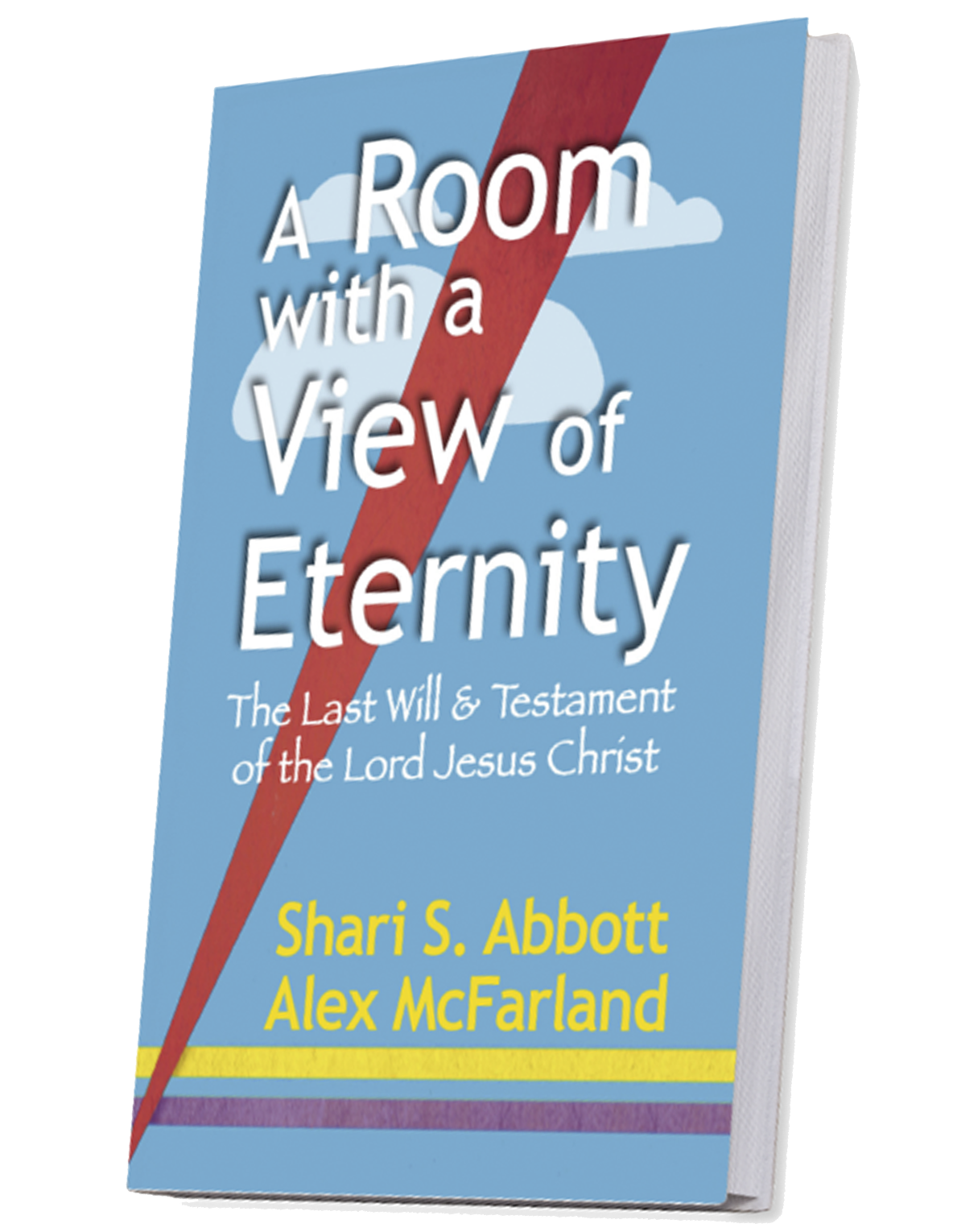 A Room with a View of Eternity—The Last Will & Testament of Jesus Christ Take a seat at the Master's table. Learn about the riches He gives to all who are His. This book will bless and encourage you, give you hope, and help you live in the joy of your salvation and the riches of Christ that are yours.
A Room with a View of Eternity—The Last Will & Testament of Jesus Christ Take a seat at the Master's table. Learn about the riches He gives to all who are His. This book will bless and encourage you, give you hope, and help you live in the joy of your salvation and the riches of Christ that are yours.

The Top Ten Got Questions? in 2023
- The Meaning of NUMBERS in the Bible?
- Was Jesus CRUCIFIED on Wednesday, Thursday, or Friday?
- How was Jesus Like a Worm? What’s the CRIMSON (OR SCARLET) WORM in Psalm 22?
- How are the Shepherd’s ROD and STAFF Different?
- How long did JOB SUFFER?
- What is the Significance of the Wise Men's THREE GIFTS? And were they kings?
- Did The Wise Men Arrive 12 DAYS AFTER JESUS’ BIRTH? Or Was It Much Later?
- Jesus’ Last Days TIMELINE: the Cross and the Resurrection
- The Meaning of COLORS in the Bible?
- Did Jesus Fight Satan to Take Back the KEYS of Death and Hell?
There is much to be learned from those who have gone before us in the faith. Check out our Cloud of Witnesses category that features the words of departed saints who are now with the Lord in glory. Their words equip and encourage us even to this day. Take a few minutes to hear...
- ONLY ONE LIFE, Twill Soon Be Past – by C.T. Studd (1860 – 1931)
- “The Love of God is Greater Far” by Frederick M. Lehman (1917)
- Prayers from Billy Graham
- Who Was Robert Robinson? What’s the Story Behind “Come Thou Fount”
- “Immanuel” — A Poem by Charles Spurgeon (1834-1892)
- Who Am I? A Poem by Deitrich Bonhoeffer (1905-1945)
- Understanding the Everlasting Arms of God, by J.R. Miller (1840–1912)
- 24 Reasons Why I Love America, by John Wayne (1907-1979)
- Give Me Perpetual Broken-heartedness (from The Valley of Vision)
- Abide with Me, by James Smith, 1859
This remains one of our most popular pages viewed.![]()

TOP TEN Videos from Reasons for Hope* Jesus
- Memorial Day BAGPIPES TRIBUTE: Amazing Grace
- RISE AND SHINE and Give God the Glory, Glory!
- WERE YOU THERE When They Crucified My Lord?
- PAUL HARVEY: THE BIRDCAGE
- PRESIDENT RONALD REAGAN: A SOLDIER'S PLEDGE
- Hark! the Herald Angels Sing -- CHARLIE BROWN Christmas
- JOHN WAYNE ~ WHY I LOVE AMERICA
- Jimmy Stewart - Nativity Scene Prayer: Mr. Krueger's Christmas
- THE LEGEND OF THE CANDY CANE - A Christmas Story to Share
- Not by Might, Not by Power, But BY MY SPIRIT says the Lord (Zechariah 4:6)
*****************








